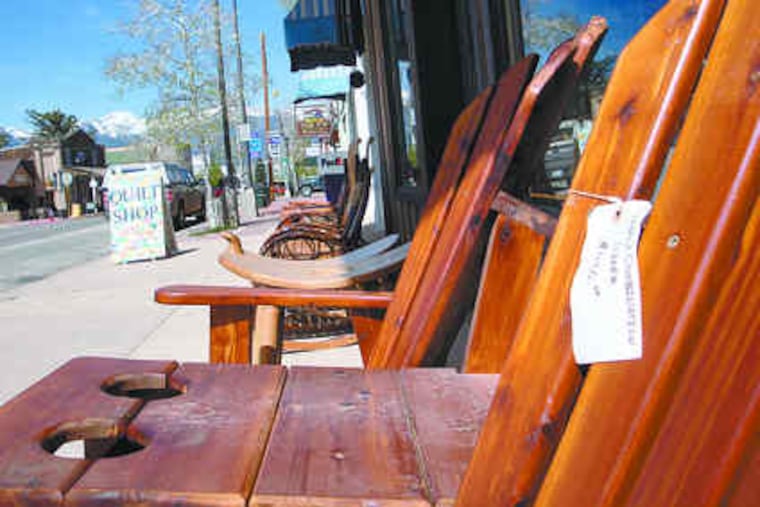
WESTCLIFFE, Colo. - A new road sign cautions drivers to watch for Amish horse-drawn buggies in the valley beneath Colorado's Sangre de Cristo mountains. Highway pull-offs and dedicated horse-and-buggy paths are in the works.
Amid the serenity and isolation of southern Colorado, hamlets such as Westcliffe, La Jara, and Monte Vista are welcoming Amish families who are moving West to escape high land prices and community overcrowding back in Indiana, Ohio, and Pennsylvania.
"The reason we moved out West is the farmland is a little bit cheaper and it's not as heavily populated, a little more open space and a little more opportunity for young people to get started with their own farms," said Ben Coblentz, a 47-year-old alfalfa farmer from Indiana. "The general public seems to have a little slower pace of life than what it was back east. Everybody here respects us."
Of an estimated 231,000 Amish nationwide, more than 60 percent still live in Ohio, Pennsylvania, and Indiana.
But from 2002 to 2008, Colorado's Amish population went from zero to more than 400, according to the Young Center for Anabaptist and Pietist Studies at Elizabethtown College. Montana, with an estimated 540 Amish, and Colorado now have the westernmost Amish settlements in the United States. Colorado ranks seventh in the nation in Amish immigration, according to the Young Center.
Coblentz moved to Monte Vista four years ago with his wife, Laura, and their four children. They were the 12th Amish family to settle in the area.
"There are 28 families now," Coblentz said. Others will likely follow.
"I see it happening where there will be a lot more Amish making a westward movement, just because of the land prices," said Stephen Scott, a research associate at the Young Center.
Cropland is worth an average $1,400 per acre in Colorado, compared with $6,000 in Pennsylvania and about $4,000 in Ohio and Indiana, according to a 2007 census by the U.S. Department of Agriculture. Cropland values in Pennsylvania jumped 17 percent from 2006 to 2007 but by only 6 percent in Colorado.
The Amish are a Christian denomination who trace their roots to the Protestant Reformation in 16th-century Europe and migrated to North America in the 18th and 19th centuries. Over the last century, many have turned to nonfarm work such as family owned shops. They avoid hooking up to the electrical grid because of a belief that doing so will lead to a dependence on the outside world.
Some eastern Amish families simply have outgrown their communities. The average Amish couple have seven children, and the total population doubles about every 20 years, said Thomas Meyers, a sociology professor at Goshen College in Indiana.
"There's an increasing need for land for young couples that want to get established," said Meyers.
Jim Austin, a commissioner in Colorado's Custer County, which includes Westcliffe, couldn't be happier about the newcomers.
"Our goal is hopefully to preserve this valley," Austin said about his efforts to bar development from the green meadows he calls home between the Sangre de Cristo and Wet mountains. "They are hardworking, down-to-earth, pretty simple folks. From what I see, I like it. They are going to be good neighbors."
An Amish family recently opened Yoder's Mountain View Furniture on Westcliffe's Main Street. On one recent day, a woman wearing a black apron, bonnet and long sleeves sat outside reading in one of the hand-crafted chairs advertised for sale. Business is slow, but Austin, his Amish neighbors and longstanding residents like it that way.
"I help them out and drive them to town whenever they need a ride," said Bruce Hornig, a Monte Vista farmer and Coblentz's neighbor. "Everybody out here in Colorado waves to everybody. The people are so much nicer."
Coblentz, like all Amish, dresses in plain clothes - black pants and a white or blue shirt. Women wear dresses, bonnets and aprons. He doesn't drive a car, use a computer, watch TV or allow a phone in the house, which he built from scratch. His family attends church at a neighbor's house. His two school-age sons go to a community-run school. His older son and daughter both married and moved to nearby farms.
"The reason we live the way we do is it seems to kind of separate us from the mainstream world, makes it a little easier to resist temptations - a quiet life," Coblentz said. "It doesn't make us any better. We're still human like everybody else. . . . It makes it a little easier."